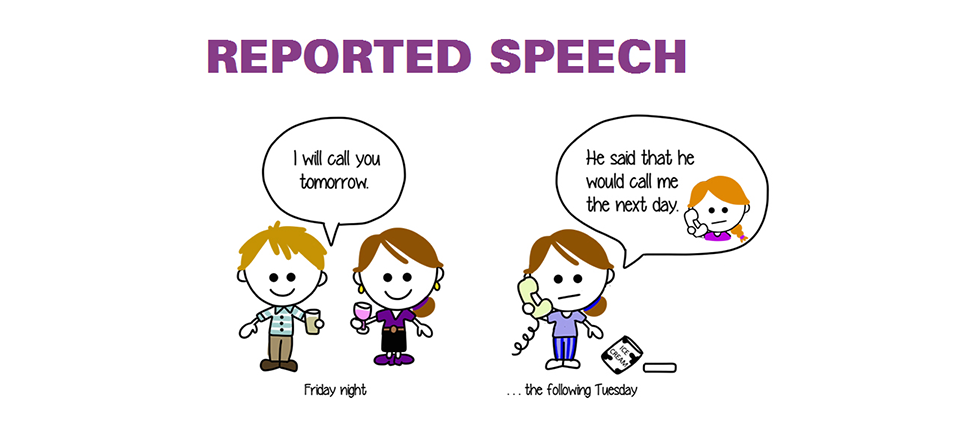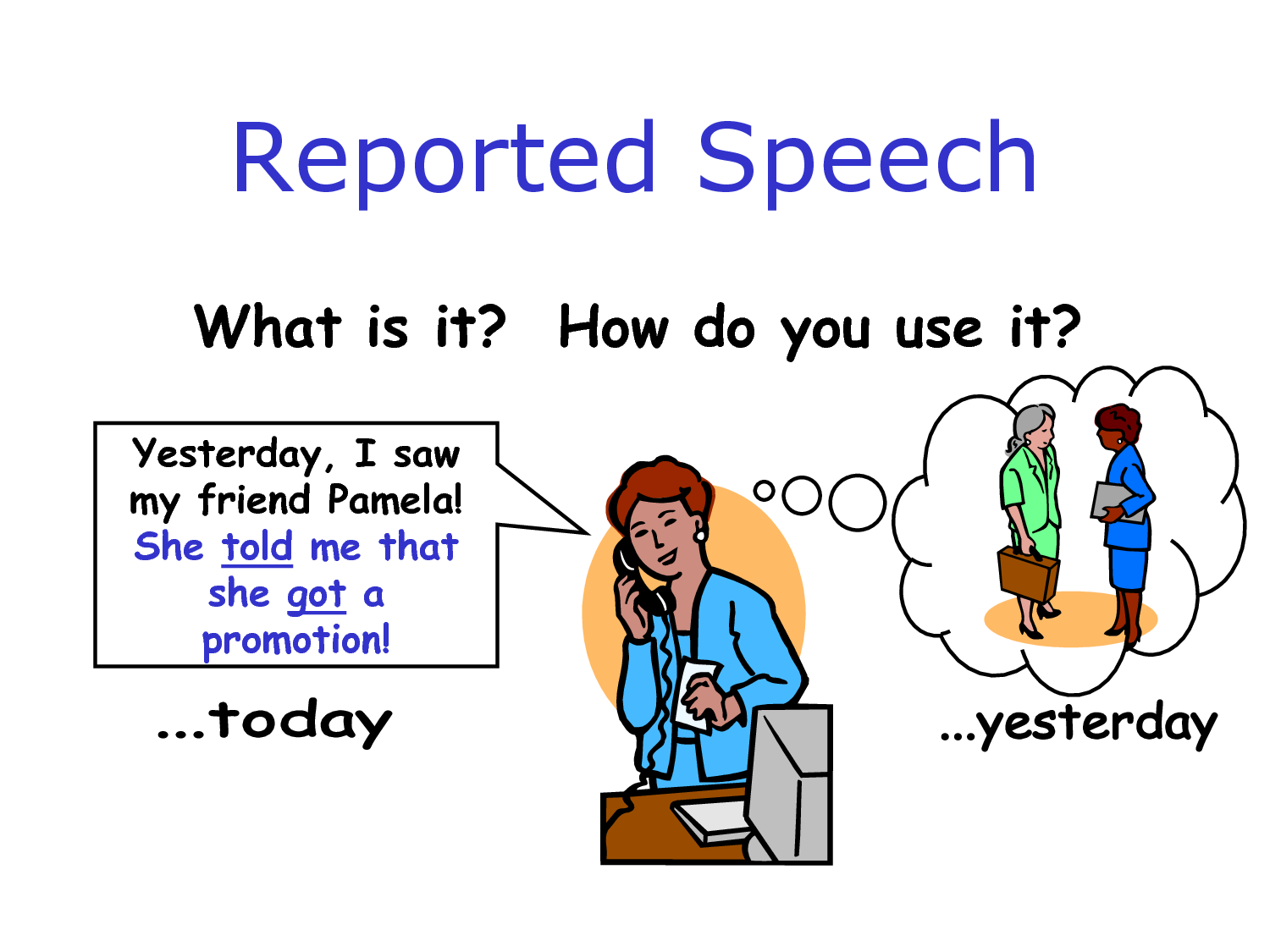CÂU TƯỜNG THUẬT (hay còn gọi là CÂU GIÁN TIẾP) là loại câu không thể bỏ qua trong quá trình luyện thi IELTS. Bài viết dưới đây cung cấp cho chúng ta kiến thức về CÂU TƯỜNG THUẬT bao gồm: Cách thay đổi thì của động từ; Cách chuyển đổi thời gian; Câu hỏi tường thuật và Động từ tường thuật. Chúng ta hãy cùng tìm hiểu thôi nào!

- Chúng ta có thể sử dụng câu tường thuật (câu gián tiếp) để thuật lại bằng văn bản hoặc lời nói về những gì ai đó đã nói.
1. CÁCH THAY ĐỔI THÌ CỦA ĐỘNG TỪ (TENSE CHANGES)
- Khi chúng ta thuật lại những gì ai đó đã nói, đôi khi chúng ta thay đổi thì của động từ chính: chúng ta di chuyển các thì 'lùi lại' một thì.
|
Thì gốc của động từ chính |
Thì của động từ trong câu tường thuật | ||
| 1 |
present simple ex: I live in Korea. |
→ |
past simple ex: He said he lived in Korea. |
| 2 |
present continuous ex: I am living in Korea. |
→ |
past continuous ex: He said he was living in Korea. |
| 3 |
past simple ex: I lived in Korea. |
→ |
past perfect ex: He said he had lived in Korea. |
| 4 |
past continuous ex: I was living in Korea. |
→ |
past perfect continuous ex: He said he had been living in Korea. |
| 5 |
present perfect ex: I have lived in Korea. |
→ |
past perfect ex: He said he had lived in Korea. |
| 6 |
past perfect ex: I had lived in Korea. |
→ |
past perfect ex: He said he had lived in Korea. |
| 7 |
be going to ex: I am going to live in Korea. |
→ |
was / were going to ex: He said he was going to live in Korea. |
| 8 |
will ex: I will live in Korea. |
→ |
would ex: He said he would live in Korea. |
| 9 |
may / might ex: I may / might live in Korea next year. |
→ |
might ex: He said he might live in Korea next year. |
| 10 |
can ex: I can live in Korea. |
→ |
could ex: He said he could live in Korea. |
| 11 |
must ex: I must live in Korea. |
→ |
had to ex: He said he had to live in Korea. |
- Tuy nhiên, chúng ta thường chọn không thay đổi thì của động từ. Điều này có thể là do:
+ Những gì chúng ta đang nói vẫn còn đúng:
ex: 'This has nothing to do with the figures.'
→ He said that the job losses have nothing to do with the figures. (at the time of reporting this fact is still true)
+ Thì ban đầu là quá khứ đơn hoặc quá khứ tiếp diễn:
ex: 'We decided to change the way we operate our business two years ago.'
→ West claimed that they decided to make changes two years ago.

2. ĐỘNG TỪ TƯỜNG THUẬT (REPORT VERBS)
- Khi chúng ta tường thuật những gì ai đó đã nói, chúng ta không thể sử dụng chính xác các từ giống như trong lời nói gốc. Chúng ta có thể chọn từ nhiều động từ tường thuật khác nhau để giúp chúng ta truyền đạt ý tưởng chung bằng cách sử dụng ít từ hơn so với trong lời nói gốc. Dưới đây là một số động từ tường thuật phổ biến:
|
1. reporting verb (+ that) |
|
agree, admit, announce, argue, believe, claim, complain, deny, explain, insist, promise, propose, reply, request, say, state, suggest, think, warn: ex: The director claimed (that) they decided to make the changes two years ago. |
|
2. reporting verb + someone + that |
|
assure, inform., persuade, remind, tell: ex: He assured the interviewer that the company would continue to operate in the future. |
|
3. reporting verb + to-V |
|
agree, ask, claim, offer, promise, propose, refuse: ex: He promised to do his best for the employees. |
|
4. reporting verb + someone + to-V |
|
advise, ask, encourage, invite, persuade, remind, tell, urge, warn: ex: They urged the employees to stay calm. |
|
5. reporting verb + preposition + -ing / noun |
|
argue about, complain about: He complained about the terrible food. apologise for: The company apologised for causing redundancies. insist on: The manager insisted on seeing the staff. complain to: He complained to the manager. |
|
6. reporting verb + someone + preposition + -ing / noun |
|
accuse of: They accused the company of planning badly. advise about, remind about: They reminded her about the meeting. advise on, congratulate on: He advised me on the deal. blame for, thank for: They thanked her for coming. |
|
7. reporting verb + -ing / noun |
|
accept, admit, deny, suggest: ex1: The director denied having financial problems. ex2: The employees accepted the offer of early redundancy. |
|
8. reporting verb + someone (+ noun) |
|
offer, promise, refuse: ex: He offered her a job. |
► NOTE: Một số động từ giống nhau có thể được sử dụng theo những cách khác nhau (ví dụ: admit, claim, offer, persuade):
ex1: West claimed that they decided to make the changes two years ago.
ex2: West claimed to have decided to make the changes two years ago.
3. CÁCH CHUYỂN ĐỔI THỜI GIAN (TIME REFERENCES)
- Đôi khi chúng ta cần thay đổi các từ hoặc cụm từ khác trong câu tường thuật nếu chúng được tường thuật tại một thời điểm khác với các từ gốc:
| today → that day | tomorrow → the following day / the next day |
| yesterday → the day before | next week → the following week |
| now → then / straight way | this → that |
| here → there |
ex: He said he would see me tomorrow. (reported on the same day)
→ He said he would see me the next day. (reported at a later date)
- Đôi khi ngữ cảnh yêu cầu thay đổi đại từ:
ex1: 'I like you.' → He said he liked her.
ex2: 'I like you.' → I said I liked her.

4. CÂU HỎI TƯỜNG THUẬT (REPORTING QUESTIONS)
- Chúng ta sử dụng thứ tự từ như trong câu trần thuật khi tường thuật câu hỏi:
ex: I asked Mr West how he was going to deal with the problem. (not I asked Mr West how was he going to deal with the problem.)
- Để tường thuật câu hỏi với các từ để hỏi (who, what, where, why, when, how) chúng ta giữ nguyên từ để hỏi:
ex: 'What has led to this situation?'
→ The interviewer asked what had led to this situation.
- Chúng tôi có thể sử dụng if hoặc whether để tường thuật câu hỏi Yes / No:
ex: 'Are these cuts a result of Angleside's poor performance over the past five years?'
→ I asked if / whether these cuts were the result of Angleside's poor performance over the past five years.
► NOTE: Chúng ta KHÔNG sử dụng dấu chấm hỏi cho các câu hỏi tường thuật.
NGỮ PHÁP BỔ SUNG: CÁC CÁCH TƯỜNG THUẬT KHÁC |
Chúng ta có thể sử dụng các cách diễn tả khác để tường thuật lời nói, ví dụ: according to (phổ biến trong tiếng Anh nói và tiếng Anh viết), apparently, supposedly, seemingly (phổ biến hơn trong tiếng Anh nói):
ex: According to the radio programme, they are cutting 150 jobs.








